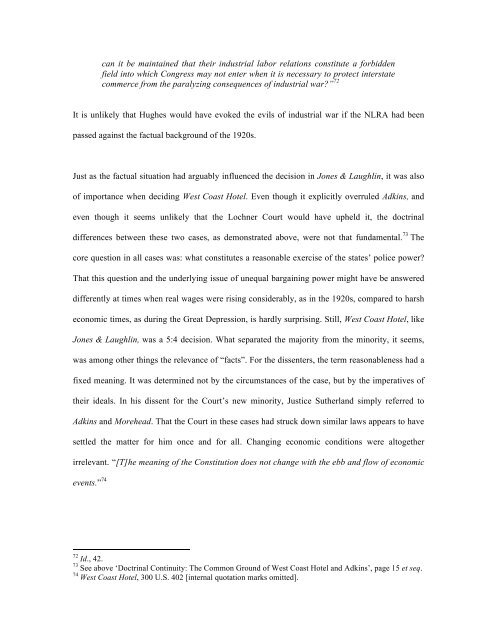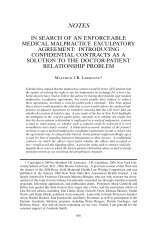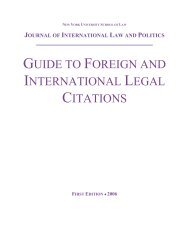Jasper Finke, Crisis and Law - New York University School of Law
Jasper Finke, Crisis and Law - New York University School of Law
Jasper Finke, Crisis and Law - New York University School of Law
Create successful ePaper yourself
Turn your PDF publications into a flip-book with our unique Google optimized e-Paper software.
can it be maintained that their industrial labor relations constitute a forbidden<br />
field into which Congress may not enter when it is necessary to protect interstate<br />
commerce from the paralyzing consequences <strong>of</strong> industrial war?” 72<br />
It is unlikely that Hughes would have evoked the evils <strong>of</strong> industrial war if the NLRA had been<br />
passed against the factual background <strong>of</strong> the 1920s.<br />
Just as the factual situation had arguably influenced the decision in Jones & Laughlin, it was also<br />
<strong>of</strong> importance when deciding West Coast Hotel. Even though it explicitly overruled Adkins, <strong>and</strong><br />
even though it seems unlikely that the Lochner Court would have upheld it, the doctrinal<br />
differences between these two cases, as demonstrated above, were not that fundamental. 73 The<br />
core question in all cases was: what constitutes a reasonable exercise <strong>of</strong> the states’ police power?<br />
That this question <strong>and</strong> the underlying issue <strong>of</strong> unequal bargaining power might have be answered<br />
differently at times when real wages were rising considerably, as in the 1920s, compared to harsh<br />
economic times, as during the Great Depression, is hardly surprising. Still, West Coast Hotel, like<br />
Jones & Laughlin, was a 5:4 decision. What separated the majority from the minority, it seems,<br />
was among other things the relevance <strong>of</strong> “facts”. For the dissenters, the term reasonableness had a<br />
fixed meaning. It was determined not by the circumstances <strong>of</strong> the case, but by the imperatives <strong>of</strong><br />
their ideals. In his dissent for the Court’s new minority, Justice Sutherl<strong>and</strong> simply referred to<br />
Adkins <strong>and</strong> Morehead. That the Court in these cases had struck down similar laws appears to have<br />
settled the matter for him once <strong>and</strong> for all. Changing economic conditions were altogether<br />
irrelevant. “[T]he meaning <strong>of</strong> the Constitution does not change with the ebb <strong>and</strong> flow <strong>of</strong> economic<br />
events.” 74<br />
72 Id., 42.<br />
73 See above ‘Doctrinal Continuity: The Common Ground <strong>of</strong> West Coast Hotel <strong>and</strong> Adkins’, page 15 et seq.<br />
74 West Coast Hotel, 300 U.S. 402 [internal quotation marks omitted].
















